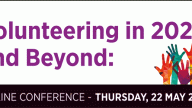Navigating national volunteering challenges in a multidisciplinary organisation
Eddie Hartley discusses how volunteer programmes can evolve with the times.
My name is Eddie Hartley (he/him) and I am the National Volunteer Manager for Healthcare & Fundraising at Sue Ryder. I have been with the organisation for 8 years, since I was 15, where I started as a retail volunteer and moved through different roles throughout my time at sixth form, university, and most recently after graduating from my degree in Law with French from the University of Nottingham.
At Sue Ryder, volunteers are at the heart of everything we do—supporting people through the most difficult times of their lives. Whether providing a warm welcome in our hospices, helping in our charity shops, or raising vital funds, our volunteers are essential to the care and support we provide across the UK. But managing volunteers in today’s landscape brings both challenges and opportunities—particularly in a large, geographically diverse organisation like ours.
One of the most pressing issues we face is ensuring that our volunteering offer is accessible and appealing to a wide and diverse audience. Like many long-established charities, Sue Ryder has a strong reputation, but this can sometimes lead to assumptions about who our volunteers are—or should be. We’re working to change that by reviewing how we communicate with volunteers, publishing their stories, and how we present opportunities to ensure they feel genuinely open to all.
Internally, another challenge is engaging volunteer line managers who are balancing already demanding roles, particularly in our healthcare settings. Many aren’t volunteering specialists, and with limited time and resource, it’s crucial we make the experience as straightforward and beneficial as possible. That means clear guidance and a focus on how volunteering adds value—not just for our services, but for staff teams as well.
Budget constraints are a reality across the sector, and our team is no exception. With a modest budget, we focus on doing more with less—prioritising personal, meaningful recognition and creating systems that support volunteers and staff without unnecessary complexity. The key is creativity: making the most of what we have and building a culture where volunteers feel seen and appreciated every day, through handwritten cards and online social events, to name a few.
Technology also presents both benefits and barriers. While digital tools have helped us scale and improve communications, not all of our volunteers are digitally connected—or confident. We’re careful to ensure that tech isn’t a barrier to involvement. This includes offering paper-based resources, and, where possible, volunteer buddies to help volunteers stay engaged and stay compliant in training.
Managing a volunteering programme that spans the country means working with teams that have different priorities, pressures, and community contexts. A one-size-fits-all approach doesn’t work. Instead, we invest in listening—sharing best practice, inviting feedback, and ensuring local teams feel supported but empowered to shape what volunteering looks like in their area.
Like many organisations, we’ve also had to adapt our approach in response to the cost-of-living crisis. We know that for some people, even volunteering can come with a cost. To ensure volunteering remains inclusive, we’re exploring more flexible roles—shorter time commitments, remote opportunities, and reimbursing expenses. Flexibility is more than just a nice-to-have; it’s essential.
Inclusion and accessibility are at the core of our approach. We are dedicated to actively creating an environment where people feel welcomed, supported, and valued. That includes providing equitable opportunities for volunteers to directly give feedback, through our volunteer forum or suggestion box. Inclusion is ongoing work, and it’s never finished.
Finally, as with any organisation working with volunteers, managing risk is a key consideration. While safeguarding and compliance are vital, we also recognise that excessive red tape can hinder engagement. We’re working to simplify and streamline our volunteer journey, ensuring it protects people without discouraging them from getting involved.
The landscape of volunteering is evolving, and as volunteer managers, we need to evolve with it. At Sue Ryder, we’re committed to building a volunteer experience that’s inclusive, flexible, and genuinely meaningful. It’s not always easy, but by putting people at the centre of everything we do, we can create an environment where volunteers feel empowered to make a difference, and where their contributions are truly valued.
Eddie is speaking at Volunteering in 2025 and Beyond – Online Conference
Eddie’s session at this upcoming volunteer conference will dive into how to overcome the challenges of managing volunteers
Join us for a transformative day as we look at many aspects of volunteer management including recruiting, engaging and retaining volunteers and how to manage challenging situations. We will also examine emerging trends, the role of digital inclusion and AI in volunteering.


